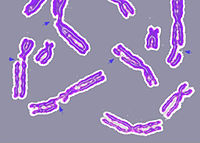
Photo from wikipedia
Prostaglandin E2 (PGE2), a lipid mediator, is released by several cell types including endometrial cells and plays a central role in bacterial infection of the endometrium during inflammation. PGE2 production… Click to show full abstract
Prostaglandin E2 (PGE2), a lipid mediator, is released by several cell types including endometrial cells and plays a central role in bacterial infection of the endometrium during inflammation. PGE2 production accumulated in Escherichia coli (E. coli) -infected bovine endometrial tissue, which increased E. coli-infected endometrial tissue damage. However, the mechanisms of PGE2 accumulation in the E. coli-infected endometrium during inflammation-associated endometrial tissue damage remain unclear. This study was conducted to investigate the role of Toll-like receptors (TLRs) 2 and 4 in increased PGE2 production in E. coli-infected endometrial tissue. E. coli and TLR2/4 agonists significantly induced cyclooxygenase-2 and microsomal prostaglandin E synthase-1 expression and PGE2 synthesis detected by RT-PCR, Western blot, and ELISA in the endometrial tissue. The expression and synthesis were dramatically decreased by TLR4, myeloid differentiation factor88 (MyD88), and p38 mitogen-activated protein kinase (MAPK) inhibitors in E. coli-infected endometrial tissue. These inhibitors also significantly decreased proinflammatory factor (interleukin-6 and tumor necrosis factor-α) and damage-associated molecular pattern (high mobility group box-1 and hyaluronan-binding protein-1) release and tissue damage measured by double-label immunofluorescence in E. coli-infected endometrial explants. Our work provides in vitro evidence that TLR2/4-MyD88/p38 MAPK promotes PGE2 synthesis and E. coli-infected endometrial tissue damage, which may be useful for improving PGE2-based therapies for endometritis.
Journal Title: Theriogenology
Year Published: 2020
Link to full text (if available)
Share on Social Media: Sign Up to like & get
recommendations!